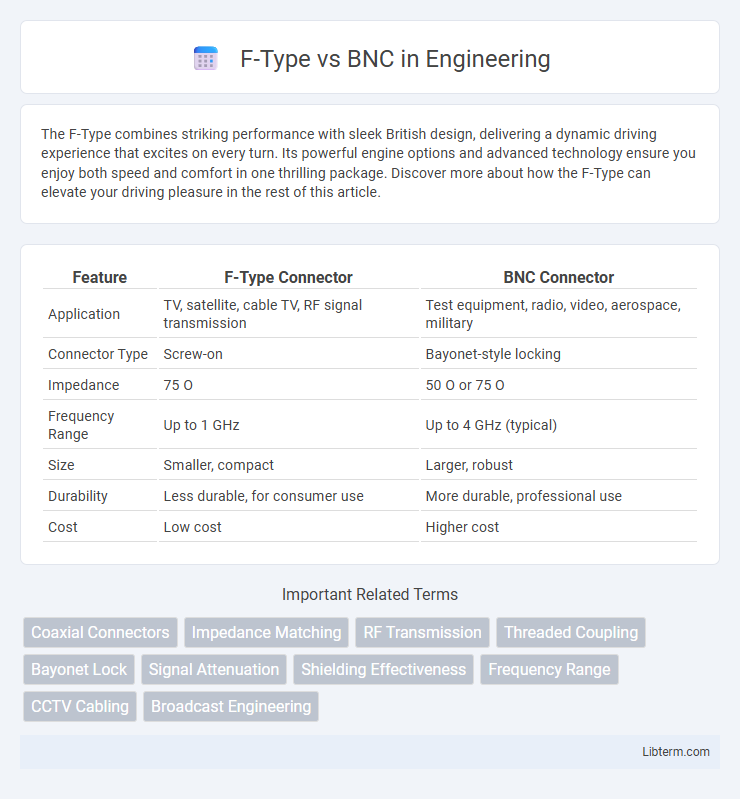The F-Type combines striking performance with sleek British design, delivering a dynamic driving experience that excites on every turn. Its powerful engine options and advanced technology ensure you enjoy both speed and comfort in one thrilling package. Discover more about how the F-Type can elevate your driving pleasure in the rest of this article.
Table of Comparison
| Feature | F-Type Connector | BNC Connector |
|---|---|---|
| Application | TV, satellite, cable TV, RF signal transmission | Test equipment, radio, video, aerospace, military |
| Connector Type | Screw-on | Bayonet-style locking |
| Impedance | 75 O | 50 O or 75 O |
| Frequency Range | Up to 1 GHz | Up to 4 GHz (typical) |
| Size | Smaller, compact | Larger, robust |
| Durability | Less durable, for consumer use | More durable, professional use |
| Cost | Low cost | Higher cost |
Introduction: F-Type vs BNC Connectors
F-Type and BNC connectors serve distinct roles in RF signal transmission, with F-Type connectors widely used in cable television and satellite applications due to their screw-on design providing secure connections and low signal loss. BNC connectors feature a bayonet-style locking mechanism ideal for professional video, radio frequency, and test equipment, offering quick connect and disconnect capabilities. Their differing designs and impedance ratings make F-Type connectors preferable for 75-ohm domestic video signals, while BNC connectors suit both 50-ohm and 75-ohm systems often found in high-frequency industrial and military environments.
Overview of F-Type Connectors
F-Type connectors are widely used in RF applications for cable television, satellite TV, and broadband internet, known for their screw-on design ensuring a secure, low-loss connection. They are typically designed for coaxial cable with a 75-ohm impedance, optimizing signal quality in high-frequency transmissions. Unlike BNC connectors, F-Type connectors provide a more straightforward installation and cost-effective solution for residential and commercial communications systems.
Overview of BNC Connectors
BNC connectors, primarily used in RF and video signal applications, offer a quick-connect bayonet coupling mechanism ensuring secure and reliable connections up to 4 GHz frequency range. These connectors are favored in broadcasting, test equipment, and networking due to their precision impedance control and low signal loss. Compared to F-Type connectors, BNC connectors provide superior durability and versatility for professional-grade coaxial cable setups.
Key Design Differences
The F-Type connector features a threaded coupling mechanism that ensures a secure, weather-resistant connection ideal for coaxial cables used in cable television and satellite signals. In contrast, the BNC connector employs a bayonet lock design, allowing for quick and reliable connections primarily in professional video and radio frequency applications. The F-Type's copper center conductor and compression fitting enhance low signal loss, whereas the BNC's precision-machined, 50 or 75-ohm impedance variants optimize high-frequency signal integrity.
Signal Quality and Performance Comparison
F-Type connectors deliver superior signal quality for cable television and satellite systems due to their weather-resistant, threaded design that minimizes signal loss and interference. BNC connectors are often used in professional video and radio frequency applications, providing reliable performance with low signal degradation at high frequencies. While F-Type connectors excel in consumer broadband setups, BNC connectors offer enhanced durability and consistent impedance matching for critical broadcast and surveillance environments.
Installation and Ease of Use
F-Type connectors offer straightforward installation with a simple screw-on interface, making them popular for use with RG6 and RG59 coaxial cables in residential and commercial settings. BNC connectors require a bayonet-style twist and lock mechanism, providing a secure connection preferred in professional video, test equipment, and radio frequency applications. The F-Type is generally easier for quick, tool-free setups, while BNC connectors ensure greater stability in environments subject to vibration or movement.
Typical Applications and Use Cases
F-Type connectors are commonly used in cable television, satellite TV, and broadband internet connections due to their reliable signal transmission for coaxial cables operating at high frequencies up to 1 GHz. BNC connectors find typical applications in professional video equipment, radio-frequency systems, and test instruments, supporting frequencies up to 4 GHz with a secure bayonet mount mechanism. The choice between F-Type and BNC depends on the specific application needs, with F-Type favoring residential and broadcast applications while BNC suits precision electronic and high-frequency environments.
Durability and Longevity
F-Type connectors feature a robust threaded coupling that provides secure, weather-resistant connections ideal for outdoor cable installations, enhancing durability against environmental factors. BNC connectors, with their bayonet locking mechanism, offer reliable quick-connect functionality but may wear faster under frequent connect-disconnect cycles, potentially reducing longevity in high-use scenarios. Both connector types are constructed from corrosion-resistant materials like nickel-plated brass, but F-Type's design typically delivers longer service life in demanding conditions.
Cost Comparison: F-Type vs BNC
F-Type connectors generally cost less than BNC connectors due to their simpler design and widespread use in consumer cable television and satellite systems. BNC connectors, favored in professional video and RF applications, tend to be more expensive because of their robust construction and superior signal integrity. The cost difference influences the choice, with F-Type being preferred for budget-conscious residential installations and BNC favored for high-performance or critical signal environments.
Choosing the Right Connector for Your Needs
Selecting between F-Type and BNC connectors depends on your specific application requirements and signal type. F-Type connectors are widely used for coaxial cable connections in residential cable television and satellite systems due to their secure threaded design and excellent high-frequency performance. BNC connectors, favored in professional video and radio frequency applications, offer quick connect/disconnect capability with a reliable bayonet locking mechanism suitable for precision signal transmission.
F-Type Infographic

 libterm.com
libterm.com